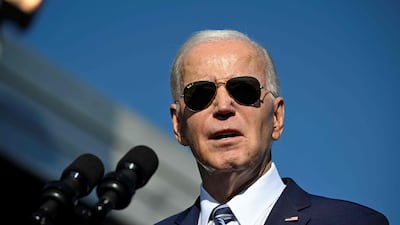As US President Joe Biden arrives in Israel today on one of the most high-stakes foreign trips of his presidency, he is coming to a region where millions of people are watching the continuing war on Gaza with shock, horror and apprehension, after the bloody attack by Hamas on Israel. The anxiety is well founded.
There can be little doubt that the crisis is entering an acutely dangerous and unpredictable stage. In addition to the appalling death and destruction meted out since October 7, there are signs that events could spill over into a wider, uncontrollable escalation.
A statement on Monday by Iran's Foreign Minister, Hossein Amirabdollahian, predicted "pre-emptive action" from the so-called Axis of Resistance – a Tehran-backed network that encompasses militant groups in Palestine and Iraq as well as Hezbollah and Syria. On the same day, the UN Security Council failed to adopt a Russia-drafted resolution, which was backed by many Arab states, calling for a ceasefire. Meanwhile, the US is increasing its military footprint in the region, with two naval carriers taking up positions in the Eastern Mediterranean. This is not to mention a series of violent exchanges across the Israel-Lebanon border involving Hezbollah, as well as a continuation of deadly unrest in the occupied West Bank.

Amid these military developments, an intense round of diplomacy is taking place, with US Secretary of State Antony Blinken shuttling between regional capitals during the past few days and the GCC Ministerial Council meeting in Oman yesterday.
Two paths ahead are taking shape for the US. One consists of unconditionally supporting the Israeli government as it continues its full-blown military action, despite its forces saying they have already killed 1,500 Hamas operatives, many responsible for the bloody attack. The next step could be watching an Israeli ground operation and possible occupation of Gaza that draws in the country’s enemies on different fronts and is likely to spiral into a wider conflict.
The second path is one where there is a focused push by all those with leverage for de-escalation, then a ceasefire followed by aid and humanitarian corridors into Gaza, mediated contacts to resolve the hostage crisis and the beginning of a new political process.
There is much for everyone to lose if events get further out of control. Israel had been making significant headway in gaining regional recognition and Iran was in the process of mending ties with its Arab neighbours. A wider war that offers no prospect of outright victory brings little to anyone – let alone the Palestinians.
The current level of regional contacts taking place right now must be harnessed constructively. Those who value stability have a pivotal role to play in judiciously counselling against destructive policies, as King Abdullah II of Jordan has been doing in Europe this week. Mr Biden will have such an opportunity today when he meets senior Israeli leaders, and there have been some signs that he can articulate nuanced points that go beyond wholehearted support for Israel, such as his public remark than a military re-occupation of Gaza would be a mistake.
There is still time for wise counsel to pull everyone back from the brink, but the window of opportunity is a narrow one. Amid this moment of acute peril, Mr Biden needs to put in a career-defining performance. The world will be watching.


